
Mentor Introduction
Wang Xiaojun, Professor at the School of Environmental and Energy Engineering, South China University of Technology, Ph.D. supervisor, Vice President of the Guangdong Sustainable Development Association, and emergency expert at the Guangzhou Eco-Environment Bureau. He mainly engages in the research and application of advanced wastewater treatment and the development and application of novel biological nitrogen removal processes. He has received many honors, including the First Prize for Teaching Achievements at South China University of Technology, "Outstanding Party Branch Secretary" and the title of "Most Beloved Graduate Mentor" in the first session at South China University of Technology. He has cumulatively received ten scientific and technological awards from the National Ministry of Environmental Protection, the Ministry of Education, and the Guangdong Provincial Department of Science and Technology.
Academic Achievements
He has made innovative contributions in the development of coupled technologies for chemical oxidation and aerated biological filtration, as well as in the research and promotion of anaerobic-ammonium-oxidation-based nitrogen removal processes. He has led 2 projects funded by the National Natural Science Foundation and over 30 government sponsored research projects including key provincial science and technology plans, as well as more than 100 commercial research projects. His "Chemical Oxidation - Aerated Biological Filtration Combined Water Treatment Method" won a Gold Medal at the National Invention Exhibition in 2010. He has guided students to participate in innovation and entrepreneurship competitions such as the "Challenge Cup" and "Internet+" winning multiple national and provincial awards. He has published over 200 papers as the first/corresponding author in prestigious journals, including Water Research, Chemical Engineering Journal, ACS Sustainable Chemistry & Engineering, Journal of Hazardous Materials, Science of The Total Environment, Bioresource Technology and others. As the first inventor, he has been granted over 60 patents.
Social Contribution
The "Chemical Oxidation - Aerated Biological Filtration Combined Water Treatment Method" developed by Professor Wang Xiaojun fully utilizes the effectiveness of chemical oxidation and the cost-effectiveness of aerated biological filtration, effectively treating non-biodegradable organic wastewater at lower costs. This method was patented in 2005 and authorized in 2010, winning a national invention exhibition gold medal and being included in the national key scientific and technological achievement transformation recommended technologies in 2016, becoming one of the most widely applied technologies for wastewater quality upgrades in nearly a decade. The improved "Integrated Ozone and Aerated Biological Filtration Water Treatment Technology" successfully resolved COD compliance issues during wastewater quality upgrades, achieving stable effluent that meets Class I discharge standards. This technology has been Appraised as internationally advanced by experts. It received the Third Prize in Environmental Science and Protection Technology from the National Ministry of Environmental Protection in 2012 and the Second Prize in Environmental Protection Science and Technology from Guangdong Province, and was included in the Guangzhou Catalogue of Water Pollution Prevention and Control Technology Achievements in 2018. The "Non-Membrane-Based Landfill Leachate Treatment Process" achieved the first non-membrane treatment of landfill leachate in China, with stable effluent meeting the Table 2 standards of the "Pollution Control Standards for Municipal Solid Waste Landfills" with no concentrate generation. This process was included as a national key environmental protection technology in 2014 and integrated into the Ministry of Housing and Urban-Rural Development's "Technical Guidelines for Landfill Leachate Treatment" in 2016. The "Super Low Emission Technology for Class IV Surface Water" effectively removes nitrogen, phosphorus, and organic pollutants, demonstrating excellent results in the remediation of black and odorous water bodies, river water quality rectification, and compliance management of industrial wastewater in specific areas; this technology was included in the Dongguan City Water Pollution Prevention and Control Technology Guidance Catalogue in 2018. The recently developed "Anaerobic Ammonium Oxidation Technology" achieves efficient, low-carbon, and energy-saving nitrogen removal from ammonia nitrogen wastewater, significantly reducing treatment costs with broad application prospects, and has been applied in engineering in landfill leachate, dyeing and silk wastewaters, and municipal sewage, among others. Research on zeolite's technology for stable partial nitritification of low-concentration ammonia nitrogen has addressed a global challenge in the application of anaerobic ammonium oxidation technology, laying a foundation for wider application.
Team Introduction
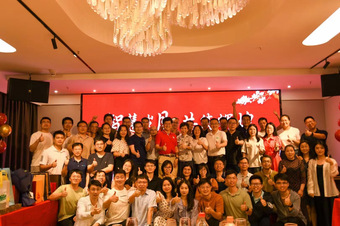
The team has trained over 100 master’s and doctoral graduates. During their studies, over 50 students have received national scholarships, university scholarships, enterprise scholarships, and other awards; graduated doctoral students primarily work in universities, state-owned enterprises, government agencies, and high-tech enterprises.
Talent Cultivation Outcomes
Graduates' Destinations
Master's class of 2005 / Ph.D. class of 2018, currently the Director of the Eco-environmental Risk Management and Emergency Technology Research Center at the South China Institute of Environmental Sciences, Ministry of Ecology and Environment, concurrently serving as the Director of the Guangdong Provincial Water Environment Emergency Engineering Technology Research Center, a member of the National Professional Committee on Disaster Accident Investigation Technology, and an emergency expert for the Ministry of Ecology and Environment and over ten provinces (regions, municipalities) in the country. She has received numerous honors, including "National Model of Women’s Contribution", "National Advanced Collective of Professional and Technical Personnel", "Guangdong Provincial March 8th Red Banner Holder", "Most Beautiful Ecological Science and Technology Worker" among others, with over 20 recognitions and accolades from the Ministry of Ecology and Environment, and won the Second Prize in National Environmental Protection Science and Technology (second place) and the Second Prize in Environmental Protection Science and Technology (first place). She has participated in the emergency response and investigation of over 80 sudden environmental incidents nationwide, has led or significantly participated in over 100 projects, published over 100 papers, and been granted over 80 patents; she has trained over 30,000 national environmental emergency management personnel.
Ph.D. class of 2013, currently employed at the School of Materials and Environmental Engineering, Shenzhen Polytechnic, serving as the Director of the Practicum Laboratory; has passed titles as Senior Engineer in Environmental Protection, Associate Researcher, and Researcher; has led one project funded by the National Natural Science Foundation and one key provincial education department project, completing another project funded by the Shenzhen Science and Technology Bureau. He has published over 40 papers, with over 20 included in SCI, and has been granted 6 national invention patents; contributed significantly to source water quality assurance and harmful algae control technologies, environmental and human health issues, and the detection, conversion, and control of persistent pollutants in water.
Ph.D. class of 2013, Youth Talent and Distinguished Researcher at South China Normal University. He has received the National Invention and Entrepreneurship Award for Innovation, the Second Prize for Collaborative Innovation Achievements in Industry-Academia-Research, and various honors for being an outstanding instructor in the “Challenge Cup” at South China Normal University. He leads 6 projects, including the National Natural Science Foundation Youth Fund and research projects in Guangzhou. He has published over 50 SCI papers, including 13 as first/communicating author, and over 20 Chinese core papers.
Master's class of 2005, currently the General Manager of Guangzhou Hualv Environmental Protection Technology Co., Ltd. He has received three provincial and ministerial-level awards, including recognition as a Pearl River Technology Star, a Huangpu District Innovation Talent, and the First Prize in the Guangdong Provincial Growth Group of the China Innovation and Entrepreneurship Competition. In 2009, he co-founded Guangzhou Hualv Environmental Protection Technology Co., Ltd. as a partner, vigorously promoting the engineering applications of developed technologies. To date, the company has completed over 200 engineering projects and employs more than 100 staff.
Master's class of 2004, currently the Deputy Director of the Eco-environmental Restoration Technology Research Center at the South China Institute of Environmental Sciences (Ministry of Ecology and Environment Emergency Research Institute). He is a senior engineer and serves as the Office Director of the Ecological and Environmental Restoration Committee of the Chinese Society of Environmental Sciences. He specializes in the prevention and control of mining and heavy metal pollution, risk management of soil and groundwater. As Technical Director, he has led the comprehensive pollution treatment project of Baihe County’s pyrite mining area, presiding over more than 30 national key research and development plans, major scientific and technological special projects on water pollution control, and provincial and ministerial projects. He has served as the chief editor of two national standards, including the “Technical Guidelines for Pollution Investigation and Risk Classification of Historical Solid Waste in Mining Areas,” has published over 50 papers, and has over 10 authorized invention patents. He has received the Second Prize in Environmental Protection Scientific and Technological Progress (first author) and the Third Prize, as well as the Third Prize in Provincial Scientific and Technological Progress, and was recognized as an outstanding individual in the soil pollution survey of key industries, as well as the “Most Beautiful Scientific and Technological Worker” by the Chinese Society of Environmental Sciences in 2024.
Master's class of 2002, the founder of Guangzhou Senmiao Environmental Protection Technology Co., Ltd., has presided over over 100 industrial wastewater treatment projects and has received high praise from the industry.
Graduate Training and Mentoring Experience and Insights
The research group primarily conducts applied basic research and applied research, striving to "write papers on the land of our country". To genuinely achieve large-scale engineering application of applied basic research, the selection of research topics becomes particularly important. The selected research topics must be innovative and at the forefront of their respective fields; otherwise, research outcomes will be difficult to publish, making it challenging for graduate students to obtain good academic results. Without published papers or corresponding academic outcomes, timely graduation may also become an issue for graduate students. Furthermore, the selected topics should address pressing technical issues in current production practice; thus, once research outcomes are formed, they can be easily applied, truly allowing for the integration of research and practice. Additionally, once a research direction is determined, it is essential to persist in that direction. Sometimes, to meet the demands for large-scale engineering applications, one must adhere to a research direction for at least 5 years or even more.
At the beginning of this century, due to our country's large population and heavy industrial burdens, stricter environmental emission standards and requirements are inevitable. How to treat non-biodegradable organics is bound to become an urgent environmental problem needing resolution. The research group has guided graduate students to conduct experimental research in this direction, resulting in the discovery of a water treatment method combining chemical oxidation and aerated biological filtration, with a patent application initiated in 2005. During that time, the group guided graduate students to explore various industrial wastewaters using new methods; due to the innovative nature of the method and excellent treatment outcomes, related research papers were easy to publish, laying a foundation for the large-scale promotion of the technology. Gu Xiaoyang and Chen Sili, who graduated in 2008, made significant academic contributions during their master’s studies, both receiving the title of “Outstanding Graduate of Nanyue” upon graduation. This area of research has been persisted in for over ten years, and the treatment method has become a preferred choice in many industrial park upgrade transformations.
A new process, once applied for over 10 years, can transform into an old process; its innovative quality gradually diminishes, and the difficulty of publishing papers increases. After 2010, I began selecting new research topics and directions. To achieve the “dual carbon” goals, low-carbon energy-saving water treatment processes are destined to become hot topics in research and application. In 2016, through experiments, graduate students discovered that utilizing zeolite during the transformation of ammonia nitrogen more readily achieves stable nitritification, which is the basis for anaerobic ammonia oxidation in the low-carbon energy-saving removal of ammonia nitrogen in wastewater. Thus, since 2016, the research group adjusted its research direction towards the removal of ammonia nitrogen in low-carbon energy-saving wastewater. The group arranged for some graduate students to conduct basic applied research in the laboratory using simulated ammonia nitrogen wastewater, while others conducted applied pilot studies at wastewater treatment sites. The new low-carbon energy-saving processes adopted also made research results easier to publish. In recent years, the quality and quantity of scientific papers published each year have increased; this year, a doctoral student published research results from pilot studies in the top journal in the water treatment field, “Water Research,” promoting the practical application of research outcomes, with over ten engineering projects related to these efforts established in the technology park at South China University of Technology.
The graduate students trained in wastewater treatment processes, whether at the master’s or doctoral level, mostly base their research on practical wastewater treatment applications. In addition to theoretical research in the laboratory, each thesis includes a chapter on the study of new process applications in practical wastewater treatment, enriching the theses and bringing research closer to practice while allowing graduate students to gain more practical training, thus making it easier to resolve practical engineering problems and truly fostering mutual promotion between production, learning, and research.
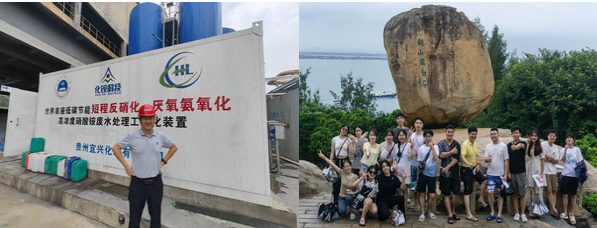
Wang Xiaojun Professor engaging in practical project site(left)
Wang Xiaojun Professor organizing a graduation trip for research group members(right)
Graduate Reflections
Chen Sili, Master's Class of 2005 / Ph.D. Class of 2018
Professor Wang Xiaojun is a knowledgeable, optimistic, and approachable teacher, an important guide in my life.
In terms of talent cultivation, Professor Wang not only imparts professional knowledge but also emphasizes nurturing our thinking skills and innovative spirit. During my master’s studies, Professor Wang almost daily took us to conduct experiments and visit sites, often discussing and sharing ideas, enabling us to learn a great deal through his influence, benefiting us immensely.
In scientific research, Professor Wang always focuses on solving practical problems, innovating and developing wastewater treatment processes, and conducting engineering application validation. During my master’s studies, I engaged in technical development and experiments both in the laboratory and at multiple sites, greatly enhancing my abilities and laying a solid professional foundation for my future work. His research outcomes have attracted widespread attention in academia and have been promoted and applied nationwide.
I feel honored to be a student of Professor Wang Xiaojun. His teachings are like a beacon, illuminating our path ahead; his exemplary strength inspires us to keep striving for our dreams.
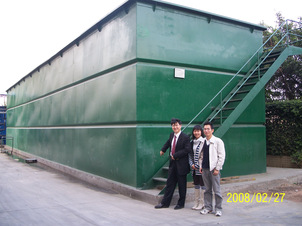
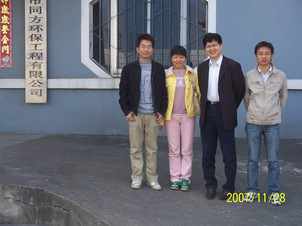
Chen Zhenguo, Ph.D. Class of 2013
As a typical engineering research mentor, Professor Wang Xiaojun focuses on practical engineering problems, finding suitable topics for students to engage in research, consciously nurturing students’ research thinking, hands-on skills, and engineering experience, while giving us ample freedom to innovate. This has led to the resolution of several technical challenges in wastewater treatment and the production of multiple water treatment technologies that are now widely applied in industry. He has been my mentor during my master’s and doctoral studies, known for his approachability and attentive guidance through various research initiatives, frequently discussing research questions in the laboratory. His support has greatly enhanced my research abilities, initiative, and innovation during my studies.

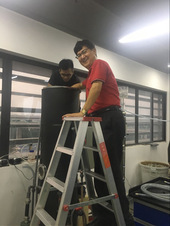
Gu Xiaoyang, Master's Class of 2005
I first met Professor Wang in 2001, my freshman year of undergraduate college. As the four years of university quickly passed into senior year, I was fortunate to be recommended to enter Professor Wang’s research group, starting my undergraduate thesis in senior year. His optimistic spirit greatly encouraged me, helping me transform from a reserved engineering student to someone who enjoys engaging with others. During my graduate studies, my topic focused on research related to chemical oxidation and aerated biological filtration. Professor Wang guided us through every step, from initial laboratory data collection to pilot application, embodying the spirit of integrating production and academia, leading by example, and ensuring practical results. His influence greatly shaped my graduate studies and subsequent professional attitude after graduation. Even post-graduation, I often discuss various project issues with him; whenever there are disagreements or I act presumptuously, he smiles generously, reminding me of the beauty in the world. A mentor is someone who imparts knowledge and guides in every way. Professor Wang’s optimism, practical approach, and generous spirit resonate with our ethos at South China University of Technology: being erudite, prudent, discerning, and diligent in practice, inspiring me to keep moving forward. I am grateful to him for everything he has done for me.
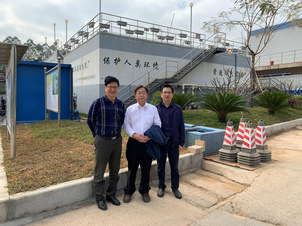
Wang Wei, Master's Class of 2004
In this valuable period of shared growth, I extend my sincerest thanks and best wishes to you—my esteemed mentor. You have not only toiled diligently in nurturing talent but have also led us through the vast sea of scientific research.
Under your careful guidance, we have transformed from ignorance to maturity, from shallow engagement to deep exploration—each step reflects your dedication and expectations. You have taught us not only professional knowledge and skills but more importantly, a rigorous scholarly attitude, an unrelenting spirit of exploration, and an infinite love for the scientific research enterprise.
In our journey of scientific research, you are our strongest support. When faced with challenges, you always lead by example, embodying the perseverance and courage of researchers through your own actions. I will always remember the scene when a leak occurred at the chlor-alkali plant, where you bravely led us in emergency work. I will also always remember your cheerful attitude in the face of scientific research difficulties.
Thank you, Professor Wang, for opening the door to a new world with the key of knowledge and for allowing our dreams to take flight through your selfless dedication. I wish you good health and success in your work in the days to come, continuing to shine brightly in the fields of scientific research and education, guiding more students toward success and brilliance.
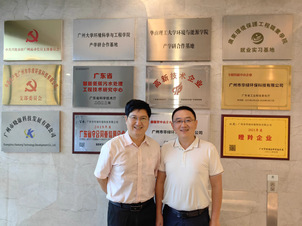
Lin Dexian, Master's Class of 2002
In a flash, it has been 19 years since I graduated with my master’s, and I am eternally grateful for my mentor’s cultivation of my innovative spirit in scientific research, fostering a sense of responsibility grounded in pragmatism in both my work and life.
Over the years, I often recall my mentor’s saying: “Write papers on the land of our country and apply technology in the needed scenarios.” In the past ten years, I have followed the steps of numerous traditional manufacturing companies establishing factories abroad, applying mature technologies to solve environmental protection issues at economical costs, contributing my modest efforts to the manufacturing sector’s international endeavors. Thanks to the solid technical foundation and sense of responsibility cultivated by my mentor, I have successfully overcome various challenges along the way, implementing projects successfully.
As I have journeyed on, every time I encountered difficulties, I have drawn inspiration from my mentor’s optimistic spirit. I always managed to overcome obstacles. I take this opportunity to express my gratitude for my mentor’s guidance and support throughout my studies and many years of work.
Photos/Text: Wang Xiaojun Professor’s Research Group
First Review: Wu Zhangyi
Second Review: Xiang Zhinan
Final Review: He Jianhua, Zhu Nengwu